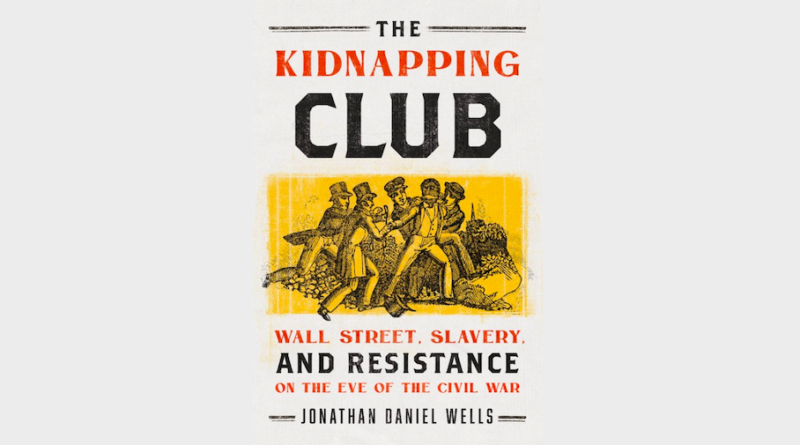REVIEW: ‘The Kidnapping Club: Wall Street, Slavery, and Resistance on the Eve of the Civil War’ by Jonathan Daniel Wells
Image courtesy of Bold Type Books / Provided by official site.
Historian Jonathan Daniel Wells’ new book, The Kidnapping Club: Wall Street, Slavery, and Resistance on the Eve of the Civil War, is an extensive look at New York City’s connection to slavery during the 19th century and the buildup to the Civil War. Specifically, the author examines the everyday ramifications of the Fugitive Slave Acts for Black New Yorkers who faced a tyranny of systemic racism and political forces that took away their human rights and livelihoods.
The focus of Wells’ attention is the so-called New York Kidnapping Club, a group of white individuals with connections to politics and law enforcement who kidnapped African Americans and sent them into bondage in the southern states. The surprise acts were violent and panic-inducing, and afterward the victims stood for sham trials that saw their futures condemned right before their eyes. Often they were not able to bring witnesses on their behalf — neighbors and family members who could have spoken on their whereabouts in the North. After the trials, many of these individuals left the supposed sanctuary of New York City, became enslaved in the southern states and were never heard from again.
David Ruggles, a Black journalist, made it his lifelong mission to stop these kidnappings, and he becomes Wells’ real-life protagonist for the heart of this distressing narrative. Ruggles worked tirelessly on behalf of the kidnapped and the Black community in New York City. He fought this racism in court, in newspapers, amongst activist groups and in protests on the streets. His passion provides a human understanding of the activism of the 19th century, and Wells fills in the rest of the details with what remains of the historical record on the kidnapped victims.
Tammany Hall politicians become an important part of the story as do the brokers working on Wall Street. One of the condemnatory realities outlined in the book is that the business elite in New York City supported pro-slavery legislation and anti-abolitionism efforts, and by extension these kidnappings, because they were making so much money off the cotton industry in the southern states. There were even documented cases — many of them — of slave ships docking in New York harbor. With each new chapter, Wells outlines a different facet of the horrors faced by Black Americans in the decades leading up to the Civil War.
As a history book, which is now available from Bold Type Books, The Kidnapping Club is accessible for many reasons. Wells’ writing style is thorough and well-documented, but his focus is on individual characters. He doesn’t paint with a broad brush; instead, he zeroes in, outlining the bravery of Ruggles and the many obstacles he faced. He gives detailed descriptions of the corrupt judges, police officials and politicians who aided and abetted this shameful enterprise. By focusing on individuals, he’s able to build character arcs and connect these stories with important historical lessons. He’s also expert at building clear images of New York City’s society, economy and politics at the time. He documents the city’s growing population and the day-to-day realities for Black New Yorkers. One particularly saddening section details a case of racism on public transportation; another one involves a most sordid and horrifying case in Brooklyn.
Throughout The Kidnapping Club, Wells stays focused on the time period in question, but he is clearly aware of the legacy of these policies and how they have led to systemic racism. This imbues the historical story with modern significance and contextualization. His research offers commentary on everything from capitalism to policing to labor to state vs. federal rights. For example, the modern-day concern of voting rights and the continued battle between federal legislators and state legislators have parallels in the words found in this book. The Kidnapping Club certainly makes one think about the legacy and impact of the events described.
Most of all, Ruggles’ activism and the plight of the people who were kidnapped leave the most lasting impression. By naming these individuals and sharing what he could find from the historical record, Wells likely hopes that there is a chance for the reader to learn from their personal narratives. This can even be found on page 1 where Wells tells a tale that begins in Norfolk, Virginia: “Their likes and dislikes, their loves and hatreds, their personalties and dreams, have been lost to history. But at least we know their names: Ben, Caleb, Southey, Ann, George Carter, Joe, John Carter, Southard, James, Charles, Jack Cooley, Severn, Michael, Slack, Isaac, Ben, and Henry.”
The Kidnapping Club is a powerful book with necessary lessons about the connections between New York City and the slave trade, plus the tireless and dangerous work of Black New Yorkers who pushed back with a collective cry for human rights and an end to the violence.
By John Soltes / Publisher / John@HollywoodSoapbox.com
The Kidnapping Club: Wall Street, Slavery, and Resistance on the Eve of the Civil War by Jonathan Daniel Wells. Bold Type Books. 368 pages. Click here for more information.

